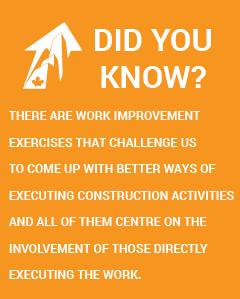

TIME MANAGEMENT PRACTICE:
Those with the expertise in managing and performing the project work are involved in the development of project schedules.
We like to think that the plans and schedules that we come up with are the best way to do the work, when they are more often the standard way to do the work based on tried and tested methods.
The underlying assumption that they are always correct may lead to missing opportunities to execute work better (cheaper, quicker, safer, with better quality) or to identify things that are not typical and do not match with standard practice.
There are work improvement exercises that challenge us to come up with better ways of executing construction activities and all of them centre on the involvement of those directly executing the work.
- For example, the Lean Construction Institute’s concept of The Last Planner looks at an approach to repetitively planning for the execution of work at a weekly or daily level of detail by involving people at the operational (site) level to recognize current constraints and come up with better solutions to challenge standard practice.
Reference:
- Lean Construction Institute: www.leanconstruction.org
NEXT INSTALLMENT: Test the constructability of a design
PREVIOUS INSTALLMENT: Construction is much easier with the right equipment and materials, ready at the right time

ABOUT THE PERFORMANCE BENCHMARKING TOOL
The free Performance Benchmarking Self-Assessment Tool is designed to assist construction and maintenance employers in measuring their organization in relation to a specific set of recognized best practices. In addition, you will be able to compare your organization’s efforts against other construction and maintenance employers. From the results of the self-assessment tool you will also be able to identify areas for continuous improvement.
The self-assessment tool is designed to be completed either individually by a member of your management team or in a collaborative setting. Consider bringing your leaders/managers together to work through the tool and take time to discuss the perspectives of each group member.
This initiative is supported by the National Research Council of Canada Industrial Research Assistance Program (NRC IRAP).

Productivity
